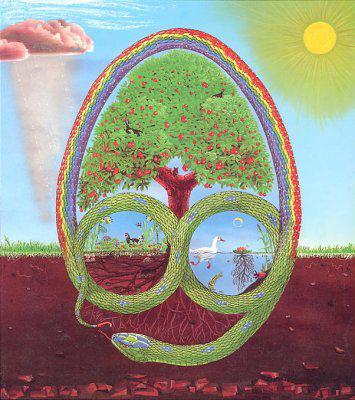As long-time readers probably know, I’ve long denigrated claims that what we today call “religion” originated during the Upper Paleolithic because early supernaturalism fostered altruism. When this argument makes an appearance, it’s often in the service of an evolutionary theism which assumes that because God is behind evolution, religion is the designed outcome of a process that logically started with “primitive” animistic beliefs and then progressively evolved toward modern religions.
With this telos in mind, evolutionary theists assume that the things modern religions sometimes do, such as encourage altruism, must have been embryonically present in the ancient animist past. My primary objection to this argument has long been that animist-shamanist “religion” isn’t much concerned with altruism or “morality.” It’s usually more instrumental in its goals and concerned with things such as the hunt, healing, war, and weather.
But I recently read something that has changed my mind. I’ve been looking in the wrong place for evidence of altruism in animist-shamanist beliefs and injunctions. There are no direct injunctions — do this or don’t do that — related to altruism. They are to be found at a deeper level, buried in the cosmology and epistemology of the animist worldview. This epiphany came when I encountered what Nurit Bird-David calls “the cosmic economy of sharing” that is embedded in animism. Such constructs are common to hunter-gatherers who have immediate return economic systems, and are likely representative of ideas that humans had for tens of thousands of years before agriculture.

It seems odd that the cosmic economy idea isn’t found in Bird-David’s more recent (1999) and comprehensive re-assessment of animism but in an earlier (1992) article which discusses the historical impact and empirical validity of Marshall Sahlins’ famous essay on the ontological joys of foraging. During the seven years between the two articles, Bird-David seems to have dropped the cosmic economy of sharing idea which I find so illuminating.
In his essay, Sahlins contends that the idea of scarcity is not a fact but instead is an ideological feature of all agricultural, industrial, and modern societies. This idea usually manifests as fear or desire. We either fear not having enough or we desire more, and all of this is predicated on taken-for-granted scarcity. Sahlins exposes scarcity as ideology by contrasting it with foraging societies which aren’t premised on scarcity and don’t take it for granted. Sahlins explains this difference empirically, by arguing that hunter-gatherers abound in resources and thus are “affluent.”
Bird-David isn’t buying Sahlins’ explanation, primarily because it is based on small-sample studies of hunter-gatherers that were in various ways flawed or questionable. When corrected, it appears that foragers work hard and desire more than was supposed. If this is so, then from where does the hunter-gatherer idea of affluence or abundance come? It is undeniably present in foraging societies, even during times of actual scarcity. It comes, Bird-Davis observes, from their cosmological and animist metaphors.
The cosmic economy of sharing is a natural consequence or logical result of animism, which is the attribution of life or vital force to plants, animals, landscapes, and weather. Having animated and constructed the world as being filled with non-human life, foragers can relate and interact with it. They can, in other words, socialize with everything that inhabits their singular cosmos. They do so through a variety of rituals and myths.
If we stopped at this point, and didn’t consider the deeper implications, this would be unremarkable. We could view it as more or less standard Tylorian animism that amounts to so much magical or pre-scientific thinking. But Bird-David doesn’t stop here because this animism is deeply imbricated with the most salient feature of foraging economies: sharing. The closest thing to a formal rule among hunter-gatherers is the sharing injunction. Those who have food and shelter must share food and shelter. In a sharing economy, maintained partly by relational ritual and partly by mythical metaphor, there is welfare and insurance for all.
When the (sharing) cosmos is considered in conjunction with the (sharing) economy, things begin to make sense. Bird-David identifies four features to the cosmic economy of sharing found in foraging societies:
1. All animated agencies, or what we call “nature,” socialize with individual hunter-gatherers;
2. The animated agencies, or what we call “nature,” give food and gifts to everyone regardless of prior kinship ties or reciprocal obligations;
3. The people regard themselves as children and relatives of animated agencies or what we call “nature”; and
4. People envision their connection to the animated agencies or “nature” as bonds of sharing between relatives.
Given this cosmos, the proper ritual, and rule observance, everything falls into place. People are born of an animated nature which then supplies the stuff of life. This otherwise inanimate “stuff” has been shared and given as gift by animate nature. The transitive property is then applied to this premise: because animated nature has shared and given to me, so must I share and give to others (who are my actual or fictive relatives).
So there it is. Altruism has been hiding in the cosmological-epistemological bush all along. A bird in hand may be worth two in the bush, but only if the bird has been ritually obtained and mythically shared.
In the cold language of evolutionary biology, the animist way looks and feels fairly adaptive. Among foragers, this code of conduct is known simply as “the Way.” It is neither set off nor demarcated as being supernatural or religious. This is apparently why it took me so long to see it.
References:
Bird‐David, Nurit. (1999). “Animism” Revisited: Personhood, Environment, and Relational Epistemology. Current Anthropology, 40 (S1) DOI: 10.1086/200061
Bird-David, Nurit. (1992). Beyond “The Original Affluent Society”: A Culturalist Reformulation. Current Anthropology, 33 (1), 25-34


